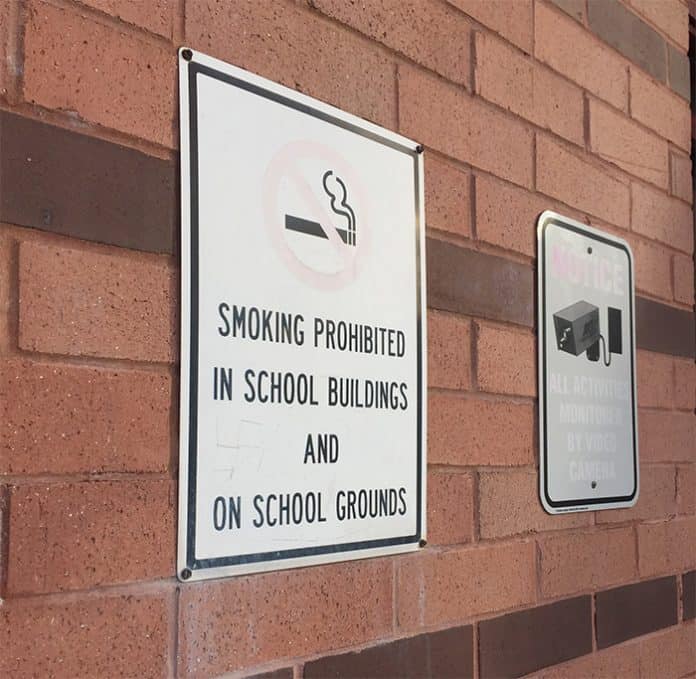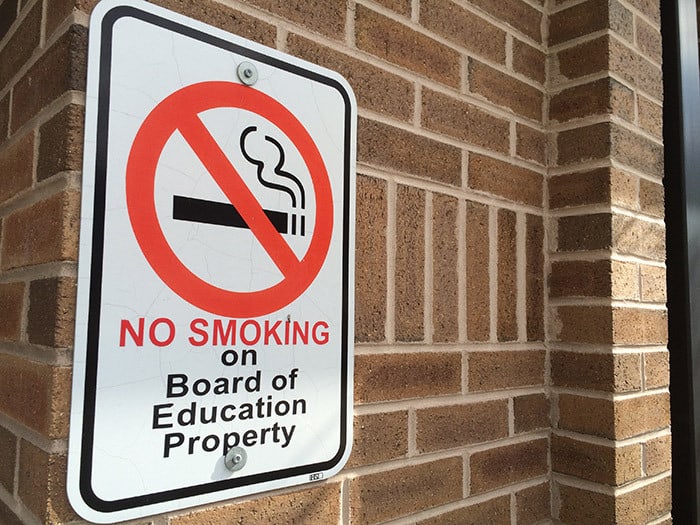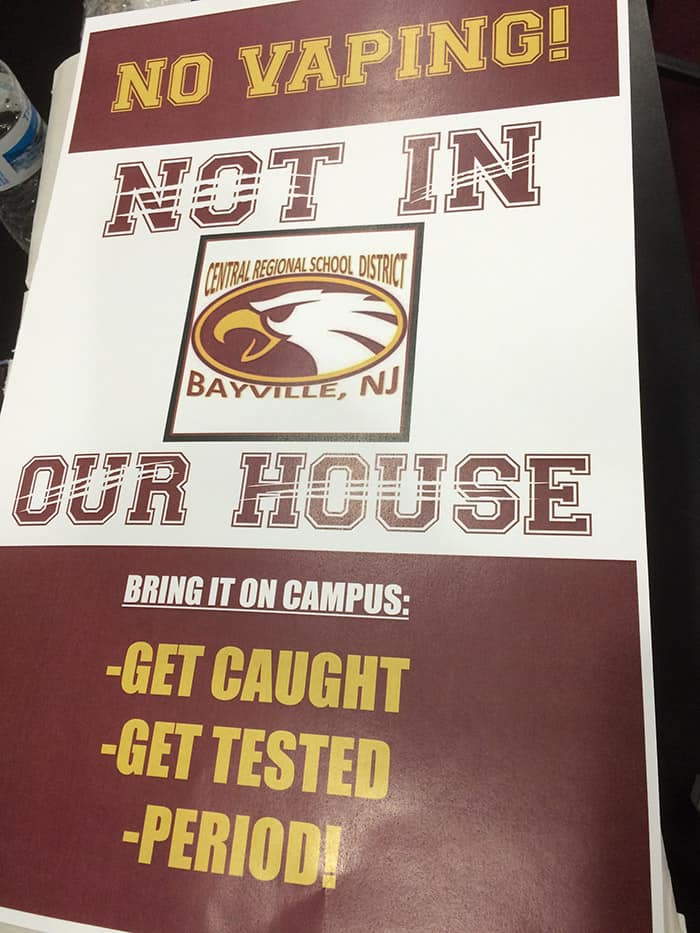
By Kimberly Bosco and Chris Lundy
OCEAN COUNTY – Despite advertising, e-cigarettes often contain more than just flavored water. With the increasing popularity of vapes among the younger generation, schools have begun to adopt no-vaping policies that align with no-smoking policies on campus. Additionally, they have had to address the fact that many students are using e-cigarettes to smoke marijuana derivatives.
A study published in 2015 by the World Health Organization showed that many e-cigarettes contained nicotine even if they claimed they didn’t. Studies found other things in them, such as metals, microscopic particles, and carcinogens.
At Southern Regional High School, Principal Eric Wilhelm said that the vaping policy is almost identical to that of the smoking policy, in that it forbids the use of the product on school grounds. He noted that the traditional smoking policy has been extrapolated to include vaping.

What makes the two smoking policies different is that, students who get caught using or possessing a vape or a Juul (a popular brand of vape), they immediately get sent for drug testing.
Wilhelm noted that the school district pays for the drug testing in this event.
Students get drug tested for vape usage because vapes, unlike cigarettes, have the ability to house marijuana in a way that is virtually undetectable, without a noticeable scent.
“With a Juul, we have no idea what is in the canister,” said Wilhelm.
If a student gets tested and is cleared for any traces of banned substances, they are simply penalized for the possession of the product, not allowed on school grounds, said Wilhelm. If the student is tested and not cleared, then they receive four days suspension and a day of detention.
Wilhelm noted that despite the recent advancements of vape products to allow for the use of other drugs, vapes have been prevalent enough to warrant a policy on school grounds for about the last 3-4 years.
The policy at Barnegat High School is similar to that of SRHS in that it aligns with the traditional no-smoking or use of tobacco products policy, according to Principal Stephen Nichol.
Nichol said that the school jumped on the process of policing vape usage once they started becoming more popular and now it is more necessary with products like Juuls or dabs, where you can’t tell what is in them.
“If a student is caught with one they get a four day suspension,” and sent out for mandatory drug testing at a local urgent care facility, he said.
If the student tests positive for drugs they receive an additional 9 day suspension and are scheduled to meet with a substance abuse counselor.
Nichol noted that sometimes students refuse the mandatory drug test, and this then becomes an automatic admission of guilt.
At Jackson schools, the situation is also quite similar. Allison Erwin, Coordinator of Communications and Technology for the Jackson School District said that the district sent out a letter to parents back in January detailing information about vapes and how they are used and what the consequences are for bringing them to school.
The letter states: “The Jackson School District treats the possession of what is known as ‘vape pens’ or other electronic ‘vaping’’ or smoking devices the same way as cigarettes.”
A student at any Jackson school caught using a vape is immediately sent for drug testing and receives a 10-day suspension if they tested positive for drugs. A student caught with one in their possession receives an automatic 2-day detention.
The letter not only educates parents about the consequences of vape usage on campus, but it also urges parents to be aware of the side effects of the devices.
“Some high school students are claiming that their parents know all about it or that the students don’t consider it smoking. What they do not realize is that the effects of vaping are not yet well known, and that a growing body of research points to the dangers of this activity,” it stated, listing harmful chemical ingredients and addiction as a few.
“Here in the Jackson School District, we are frustrated and disappointed by the growing use of these devices, especially considering the strides that have been made in the last decade to cut down on teen smoking,” stated the letter.
Erwin noted that it is important to spread awareness of this issue because it is a matter of student safety as well.
“Vapes have evolved. This year, we have noticed more of these vapes have THC oil in them,” said Michael Dillon, director of guidance and operations for the Freehold Regional High School District.
The policy for being caught with some kind of vaporizer changes depending on what the chemicals are inside. If it is a tobacco product, the consequences for it are the same as if it was a cigarette, he said.
However, if it contains THC oil, then it is treated as possession of a drug, which warrants a suspension and the police are notified.
The student is subjected to a chemical screen test. This costs the district about $150 each. If a parent chooses to use their own physician instead, they incur the cost. If there is a substance abuse issue, then the student is put in touch with a student assistance coordinator.

“A lot of parents have no idea what’s in there,” he said. Vapes sometimes have much more nicotine in them than regular cigarettes, or they could have THC. It’s often masked with a fruity scent. A letter went out in January letting parents know, and there have been other awareness activities.
An education session on the dangers of vaping will be held at Colts Neck High School on April 25 at 6:30 p.m. There will be a presentation by a retired special agent from the Drug Enforcement Administration and a time for parents to ask questions.
“We try to educate parents. We need them to partner with us,” he said.
At the Central Regional School District, every child is automatically sent for drug screening, Superintendent Triantafillos Parlapanides said.
“How can you tell if it’s just flavoring?” he asked.
Therefore, they send every student for drug tests, to err on the side of caution.
Companies that manufacture the units advertise it as healthy, but you don’t really know what’s in it, he said.
Manchester Superintendent David Trethaway said they are looking at the policy on vaping, which is included under smoking.
“There are too many variables and you don’t know what’s in there,” he said. They are not yet doing drug testing on every student caught vaping, but that option is being considered.
Toms River Superintendent David Healy said if there’s suspected drug use, they go to get tested.
The district follows guidelines for the difference between users and dealers, he said. There’s a hard stance against dealers in the district. However, if there is a student who is using, then they work to intervene in the student’s life, to try to break the cycle of use. They are held to counseling, random drug tests, and have to agree to a contract between themselves, parents, and the counselor.
This is an improvement from the old methods, when a kid would be suspended for a number of days for drug use, he said. During those days off from school, the child would just sit around and get high. Instead of acting as a deterrent, it was making their drug use and dependency worse. As a result of keeping a student in school, but supported with counseling and other measures, the district’s dropout rate declined.







